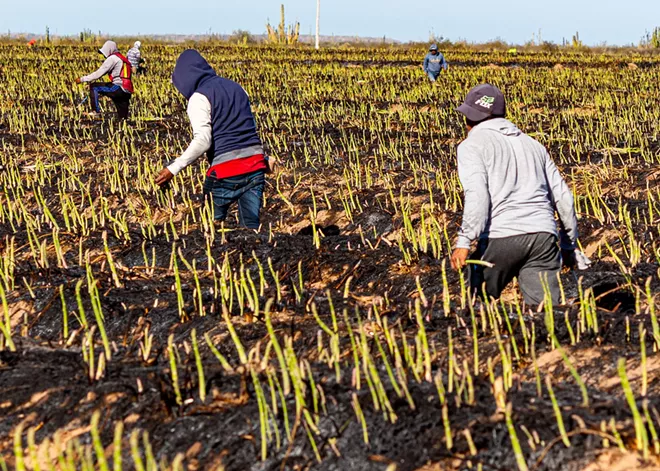
The legislative session in Olympia this year was dominated by a focus on the biennial budget. But between discussions of funding cuts and new taxes, many important policy changes were in play, including several bills aimed at strengthening protections for immigrants, which lawmakers passed and Gov. Bob Ferguson signed into law.
There are 1.2 million immigrants in Washington, including 619,000 noncitizens, of whom an estimated 325,000 are undocumented, according to the Washington State Budget and Policy Center, a nonpartisan research and policy organization. In an April report, the center estimated that people who were undocumented paid $997 million in Washington state and local taxes in 2022.
This session, lawmakers sought to protect immigrants who are vulnerable to exploitation because of their nonresident status, which exposes them to coercion in the workplace, potential court appearances that make them miss work, and detention at U.S. Immigration and Customs Enforcement facilities amid mass deportation efforts by the Trump administration.
HOUSE BILL 1232
The Northwest Detention Center, located in Tacoma and also known as the Northwest ICE Processing Center, was opened in 2004 as an immigrant detention facility. It's privately owned and operated by the GEO Group, a multibillion-dollar international corporation specializing in the management of private prisons.
The GEO Group has faced lawsuits and criticism for its management of the Northwest Detention Center.
In May 2023, the Department of Homeland Security conducted an inspection and found that the facility didn't always provide a timely response to detainee grievances or respond in a language that detainees understood. An August 2022 inspection also found the facility didn't follow proper food storage practices.
"We found boxes of canned pears that were dated September 2019 by the manufacturer as well as boxes containing frozen turkey breasts with a 'pack date' of September 2019," the 2022 federal inspection stated.
The 2023 report states the facility provided compliant medical care; however, it found that medical staff vacancies led to inconsistent preventive screening practices and an inability to locate the emergency delivery kit, used for potential births within the facility, in a timely manner.
The University of Washington Center for Human Rights also investigated the detention center and found human rights issues such as 15-day solitary confinements — considered torture by the United Nations — that were believed to have resulted in the death of a detainee who suffered from medical and psychiatric issues. Another detainee committed suicide in 2018, and in October last year a detainee was believed to have died from fentanyl withdrawal with no medical attention.
GEO Group was also sued in 2017 for labor violations for paying Tacoma detainees $1 a day for work. In January, the company was ordered to pay $23.2 million in back pay to former detainees.
The facility has recently seen an uptick in detainees due to increased ICE activity. It is consistently holding 1,400 to 1,500 people, with a maximum capacity of 1,575, according to Malou Chávez, executive director of the Northwest Immigrant Rights Project. The organization advocates for immigrants through community education and by providing legal services, and regularly works with detainees in the Tacoma facility.
Chávez says advocates are concerned about understaffing, client difficulties accessing medical care, limited interview rooms restricting the time detainees have to speak with legal counsel, and irregular meal times.
"We get to hear their stories," Chávez says. "We get to see how people are impacted by conditions, by their [lack of] access to healthy meals or medication required by their own needs, religious needs, just everything that makes a person's livelihood, even when detained in an immigration jail."
Chávez says the detention center's conditions are dire and require close scrutiny to protect the human rights of those detained. These concerns are shared by Spokane Democratic Reps. Timm Ormsby, who sponsored House Bill 1232, and Natasha Hill, who voted in favor of the bill, which passed the House 56-38 and the Senate 29-19.
The law allows the state's Department of Health to inspect the detention center and enforce compliance with state and federal laws. It establishes standards for medical care, sanitation and ventilation and imposes fines and corrective actions for noncompliance.
"The ICE detention facility in Tacoma was refusing entry by the regulators, and this was our latest attempt to try and get them access, to see what the conditions are, speak to the people that were there, and see how they were being treated," Ormsby says. "And it's our hope that this finally gets access to state regulators for life, health and safety."

HOUSE BILL 1875
After passing the House 58-39 and Senate 29-19, House Bill 1875 allows employees to take paid sick leave to participate in immigration proceedings. This includes applying for protected status, securing residency or attending deportation hearings.
Employers in Washington are required to provide workers one hour of paid sick leave for every 40 hours worked, and under the new law, this leave can now be used to attend immigration hearings. The law also allows independent contract workers, such as Uber or Lyft drivers, who have accumulated sick leave, to use it for purposes related to immigration court.
An employer may require a worker to provide advance notice for missing work if three days are missed and may ask the employee to submit documentation to verify the absence, without inquiring about a person's residency status.
Hill sponsored the bill because she was aware of several instances where people needed to attend immigration court but weren't covered by paid sick leave, which created uncertainty about their employment and financial concerns about missing work.
"We want to keep people working, we want to keep our economy strong, and we want to make sure that no matter what situation folks have to deal with in the temporary, they're kept safe and their rights are protected," Hill says.
Spokane, Yakima and Seattle are the only cities in the state with offices for the U.S. Citizenship and Immigration Services, which administers the nation's naturalization and immigration system.
Chávez says that many people often drive for hours each way to attend their hearings, which makes it difficult for them to work the same day and be present for their hearing. Before this law, people could've been fired for using paid sick leave to attend hearings.
"It's impossible for someone to both be responsible at work and then also be responsible in pursuing their hearing or their immigration case," Chávez says. "We don't want people missing work and then getting fired because they've missed work."
SENATE BILL 5104
This law will penalize employers who coerce immigrant workers in violation of labor laws, including requiring unpaid work, subjecting them to unsafe labor conditions, or violating agricultural labor requirements. The penalty, imposed by the state's Department of Labor and Industries, includes fines ranging from $1,000 to $20,000 per violation.
The law also requires the labor department to investigate complaints of coerced labor. When the department notifies an employer of a complaint, the personal information of the worker who complained will remain confidential to anyone outside the department.
The need for work equity across industries, particularly for Latino immigrants who perform intense agricultural labor, was top of mind for Hill, who voted for this bill. SB 5104 passed the House 59-38 and Senate 40-9.
"There's too many violations, and that's where the laws that we currently have on the books are intended to protect," Rep. Hill says. "But people get creative, and so that calls for, sometimes, additional policy to be put in place so that there is an extra lens for folks who are vulnerable and being exploited because of immigration status."
The law allows workers to seek help before retaliation occurs and provides protections against threats of being reported to ICE or being forced to work for less pay or under poor conditions, says Jean Hill, executive director of the Washington State Catholic Conference.
She says she testified in support of the bill because it strengthens anti-labor trafficking efforts and protects vulnerable immigrant communities, which aligns with the work of the Catholic organization.
"Every human has basic rights, values and dignity, and we want to make sure that those values and dignity are upheld in our public policies and in our workforces, wherever people are," she says. "We're here to make sure that those who may not be able to raise their voice because of fears [know] there are people who are going to raise their voice on your behalf."
However, some lawmakers have concerns about the new law, including Republican state Sen. Leonard Christian, who represents most of eastern Spokane County. Christian tells the Inlander via email that the legislation lacked bipartisan support (though nine of his 18 Republican colleagues in the Senate voted for it) and says the fines would cause more harm than good.
"That fine could put many small businesses out of business, leaving even fewer jobs in Washington state," Christian writes. "This bill seems like a big hammer approach to an issue that would best be addressed with a ramped-up approach starting with education."
SENATE BILL 5714
In late January, at a press conference local officials held in Sunnyside to address concerns about the presence of ICE agents in Yakima County, a man who identified himself as a bounty hunter (later determined to be false) claimed the federal government would deputize bail bond recovery agents and pay them $1,000 to recover undocumented immigrants.
In Missouri, Senate Bill 72 aimed to do just that and create the "Missouri Illegal Alien Certified Bounty Hunter Program," offering $1,000 bounties for each undocumented immigrant found and detained in Missouri. (The bill failed this year due to concerns of racial profiling.)
Washington Senate Bill 5714, which was introduced and passed in response to such claims, makes it illegal for bail bond recovery agents to enforce civil immigration laws and prohibits sharing a defendant's immigration status with anyone outside their business. Agents would face disciplinary action by the Department of Licensing for violations.
Christian says he supports legal immigration and has sponsored immigrants into the country, but he doesn't support "illegal immigration." He says bounty hunters aren't helping enforce immigration laws.
"SB 5714, in my opinion, was introduced in an effort to pick a fight with the Trump administration, addressing an issue that does not really exist," Christian states by email.
Rep. Hill says the need for this law also stems from what the state has seen since the George Floyd protests, namely the formation and patrolling of unlawful militias. She says defined rules are needed as vigilantes feel emboldened to patrol communities unlawfully.
"I think one of the things we wanted to address was what we've seen here in our state, which is militias that have kind of been empowered, or felt empowered, not legally, not lawfully, but to take up arms and patrol and police communities without authority, which has caused a lot of fear and terror in neighborhoods and businesses," she says.
The Northwest Immigrant Rights Project didn't testify, but supported the bill due to the increased number of ICE agents in plain clothes and the potential for the federal government to utilize private contractors to enforce civil immigration law. It's illegal for Washington law enforcement officers to work with ICE under the Keep Washington Working Act.
"I'm so happy that this bill was supported and that it ultimately passed, because we're seeing our community members disappear, and it's very scary that people in plain clothes are showing up, even in immigration court," Chávez says.
The Catholic Church has always acknowledged the rights of immigrants fleeing from violence and poverty, Jean Hill says.
"There's no legal document that gives you human dignity — that is inherent," Jean Hill says. "We need to treat every person as someone with that dignity, and not act as if someone's actions make them anything less than human. ♦





















